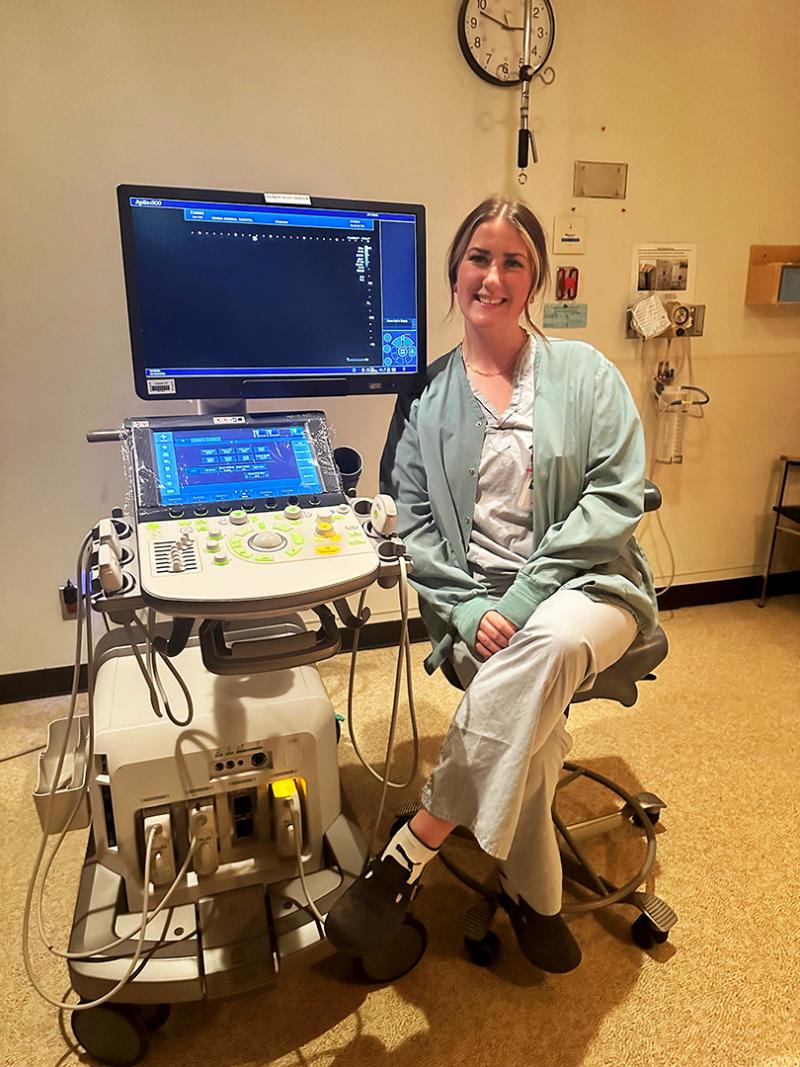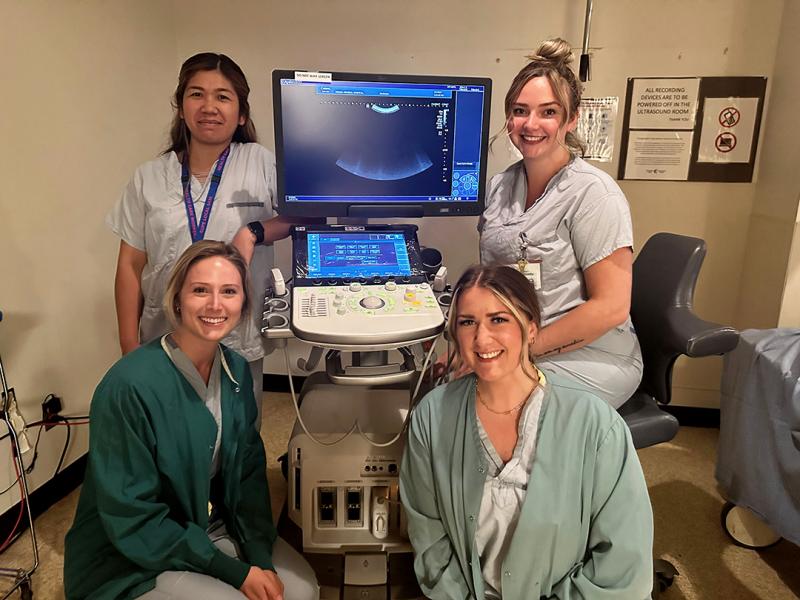Jaedyn Leier Career Spotlight
Jaedyn Leier is a Diagnostic Medical Sonographer (DMS) who works in the Ultrasound department at both Regina General and Pasqua Hospitals. Learn more about her experience with the Saskatchewan Health Authority below:
What health-care services do you provide?
"Working out of the ultrasound department at the Regina General and Pasqua hospitals, we care for ward inpatients, Emergency Room (ER), interventional cases and urgent outpatient requests. Our work is not restricted to Sonographic examinations performed in our department. Areas such as the neonatal intensive care unit (NICU), medical intensive care units (MICU) & surgical intensive care unit (SICU) often require portable investigations."
What are you responsible for as a Sonographer? Please describe a typical day for yourself.
"Sonographers are health-care professionals that play a large role within health-care and medical imaging departments. For all ultrasound examinations, patients are provided with an explanation of the study we will be undertaking. Whether this be for a diagnostic scan or a procedure (biopsy, drainage, etc.) to be performed in the department or portably. We perform an average of 6-10 Sonographic exams and/or procedures per day. Ultrasound provides patients and physicians with a large variety of exams such as, abdominal, pelvic, obstetrical, venous and arterial legs, venous and arterial arms, intra-abdominal arterial assessments, superficial structures (thyroid and scrotum) and soft tissue exams. We also provide services in the form of imaging guided procedures which include thoracentesis, paracentesis, superficial biopsy, organ biopsies and musculoskeletal injections.
When working in the hospitals, ultrasound is also used in conjunction with other medical imaging modalities. While performing these exams, Sonographers are to be moving, programming and adjusting the machine, transducer and patient to ensure we are capturing the most diagnostic images which aide in generating a preliminary report to present to the Radiologist. The Radiologist will then review the acquired imaging and generate an official report on the findings.
Unlike other forms of Medical Imaging, Ultrasound is operator dependent. Sonographers do not place patients into a machine which obtains the images. We utilize our bodies in conjunction with a hand held transducer to sweep, assess, adjust and measure every structure for our given exam. If we do not see something during the scan, the Radiologist will not see it, making ultrasound a very high stress and pressure career. It is very rewarding when clinical queries are answered in the form of pathology/abnormalities and diagnosed to help better care for the patient. Sonographers are special as we are the eyes of the Radiologist."
How is your work-life balance as a Sonographer? Please compare your current experience with other jobs you have had in the past.
"I have been working at the hospitals for the past 5 years, and a career in this setting does challenge your work-life balance significantly. At the hospitals in Regina our departments operate 7 days a week. We are open and in need of Sonographers from Monday to Sunday, including after hours. We work on standby and call from the hours of 1630hrs-0700hrs, with one Sonographer on call at each hospital. This definitely makes for a challenging work-life balance as when we are on call, you have to be readily available to go into work for the 14.5 hours following your 8 hour shift and are then scheduled another 0800hrs-1630hrs shift after your call night. With working weekends, we are typically scheduled days off during the week allowing us to accommodate for weekday appointments on our time, and to switch shifts with coworkers for family events/responsibilities, travel, fun or even just relaxation. The Ultrasound department offers full-time positions as well as a 0.8 which is 4 days a week and a 0.6 which is 3 days a week, along with casual positions. This allows you to choose what position will fit your lifestyle and work-life balance best."
Have you always wanted to be a Sonographer? Tell us more about your career path!
Throughout high school I always knew that I wanted to work in the health-care field but was never one hundred percent sure on where I was wanting to end up. I looked into multiple different options and even did some career shadowing for others jobs. I ended up requiring an ultrasound while I was in hospital and this opened my eyes to a whole new side of health-care that I did not even notice or realize existed. Upon discharge from the hospital, I started looking into ultrasound as a career path and what the requirements were. The more I researched and looked into this job the more convinced I was that this was something I wanted to pursue as my career path. After applying for school, I had seen that a family friend had completed the DMS program that I had been applying too. I then met up with her for lunch and got all of the information and she set up a shadow opportunity for me to come watch a Sonographer in action at the hospital to get a better feel for the job and its requirements.
After applying to two programs the Canadian National Institute of Health (CNIH) in Ottawa and the Southern Alberta Institute of Technology (SAIT) in Calgary. I had entry exams and entry interviews to both programs where I accepted an offer from CNIH to start in the fall of 2017. At CNIH you complete one year of schooling, which involves taking 9 classes per semester for 3 semesters. Once the theoretical component of the program has been completed, you are placed in either clinic or hospital settings for practical experience over the course of 8 months.
Once all of this is completed you are then eligible to write the Sonography Canada Registry Exams. I graduated in April of 2019 and accepted a permanent full time multi-site position with the SHA, facilitating the General and Pasqua Hospitals. I just entered my 5th year of employment and love the knowledge, independence and challenges I encounter on a daily basis while working in the hospital."
Are there opportunities to further your career as a Sonographer?
"There are multiple different ways that you are able to further your career within Ultrasound. When completing school, you enter into the work force as a Canadian Registered Generalist Sonographer (CRGS). This is what your designation becomes upon successful completion of the registry exams. Some schools in Canada also train in echocardiography. Successful candidates are able to challenge the cardiac exam through Sonography Canada becoming Canadian Registered Cardiac Sonographer (CRCS).
Vascular ultrasound is a specialized area of ultrasound requiring additional on the job training, competencies to be performed and another Sonography Canada exam to be written. There are very few Sonographers trained, registered and practicing Vascular as CRVS’s in Saskatchewan. There is certainly a demand for Sonographers with Vascular experience and opportunities to train on the job if this was something a Sonographer wanted to pursue.
Other areas that you are able to grow in ultrasound would be to become a Supervisor at either hospital or if you have an interest in Management rolls within the hospital. Out of scope Management not only oversee ultrasound, but to also direct other medical imaging departments.
Another option to further your career in Ultrasound would be to become an instructor. This option would require relocating as Saskatchewan does not have an accredited post-secondary program for Diagnostic Medical Sonography. This would be a good option for those individuals seeking the challenge of putting down roots in a different city."
Do you have any advice for students or new graduates looking to pursue a career as a Sonographer?
"For students who are currently enrolled in a national DMS program, you got this! As someone who has been through all of the schooling I know what the programs asks of you, a lot of late nights, early mornings and extensive studying over the course of 2-3 years. But keep going because when all the schooling is over and you begin your career you will be thankful for all of the work and effort that you put into it. You will learn so much in school and in your practicum, not to mention the overwhelming first year or two of working! Ultrasound is always changing, adapting and moving forward so that’s where your mindset has to be.
Sonography is not something that just comes to you in your first week, it is something you have to work for and put that effort into. Study everything, try new exams or something you maybe aren’t sure about during your practicum because the more exposure and well-rounded you are the better Sonographer you will be!"
What is the number one thing you love about being a Sonographer?
"Being a Sonographer is something that I know myself as well as all of my coworkers take pride in. I have also always been a talkative, people person, being able to talk to patients to calm them down, help them through exams or even just chat with them to get their mind off what is going on is one thing I love. We are able to help patients from neonates and pediatrics to geriatrics. Trying to pick one thing that I love the most about my job would be too hard as I have a handful of things that keep me happy that I chose this as my career path.
One of the biggest things that I enjoy about my job is the place I chose to work in, the hospital. Working in the hospitals provides me with daily challenges and diversity between patients, fellow Medical Imaging staff and ward staff. We are always working and speaking with different patients, we never know their situation health wise and always have to be on our toes and adapting to new circumstances. This makes every day we show up for work different, they are never the same as we are always doing different exams or procedures with patients that have different circumstances themselves. I truly love this part of the job because it is like going into a new job every day and never knowing what to expect from our crazy day!"




